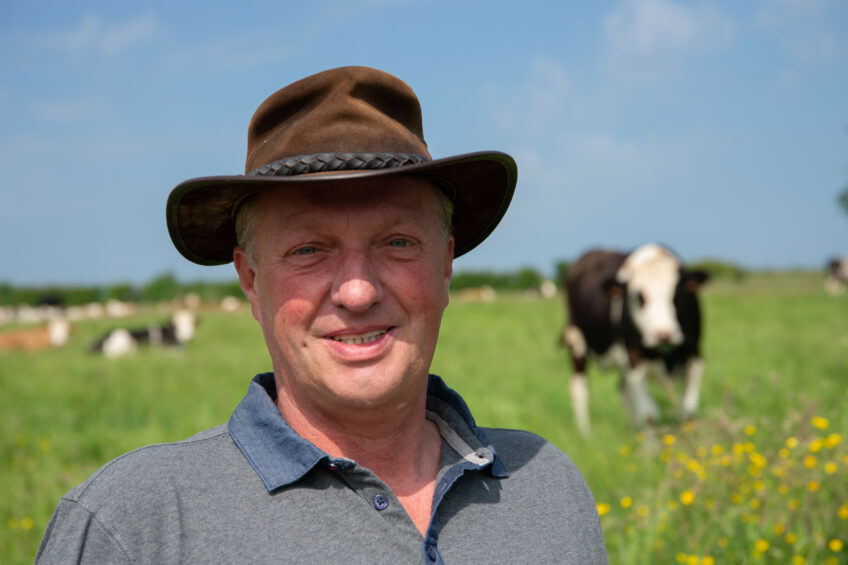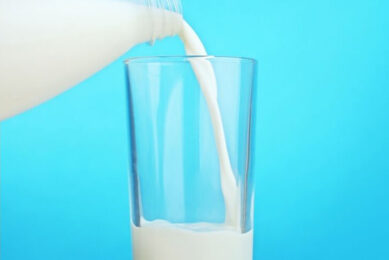EMB chairman: “When we demonstrate, milk price goes up”

A less literalist wind blows on the dairy market, notes EMB chairman Erwin Schöpges. A relief, now we need a better income for farmers.
Time slowly seems to agree more and more with the European Milk Board (EMB), thinks Erwin Schöpges, who chairs the organisation since last April. The full liberalisation of the European dairy market did not deliver what we expected of it. “Look at the tremendous market fluctuations, the crises and the tools the EU used in an attempt to rebalance the market. They are all broken!”
ProfileErwin Schöpges (54) has chaired the EMB – which was established in 2006 – since April 2015. He is a dairy farmer in Amel, in the German-speaking part of Belgium. He keeps 60 cows on 70 hectares of ground. Since the end of last year he produces organically and is supplier of Biolait Belgium. Prior to that he supplied the German BMG. His 26-year-old son wants to take over the company. He wants to combine milking with slaughter and meat sales. |
FrieslandCampina
The fact that dairy processor FrieslandCampina also seems to have lost its belief in a fully liberal dairy sector is a good thing according to Mr Schöpges, but whether or not the company chooses the appropriate remedy is doubtful. In the search for solutions for the current situation, many people talk about regulation. We prefer the word balance. The market shouldn’t be set for a long period of time, it should be balanced. Regulation isn’t necessarily wrong, and what FrieslandCampina is doing could get others thinking, but we wonder why the company wants to regulate in this way. Is a lack of processing capacity genuinely the problem or do other reasons play a role? Moreover, the changes that have been made now may create a new dependency we were unaware of before. Because where can farmers take their milk if they want to switch again?”
Less volatility on the dairy market
While pretending he barely prepared himself for the interview at his farm, Mr Schöpges is well informed of the European dairy developments. This couldn’t be any different for an EMB-chairman and conversation partner of all European organisations that have anything to do with dairy. He just returned from a busy journey through Southeast Europe and has a few important meetings with the European dairy trade organisation (Eucolait) and the European supermarket organisation Eurocommerce waiting. Mr Schöpges hopes and suspects that particularly supermarkets are interested in a less volatile dairy market. At home he has time for a moment of rest. Although… immediately after returning home, Mr Schöpges has to do all the work himself. The farm assistant and his son took the day off to go to the fair in town. Luckily the cows are in the field, and Mr Schöpges only milks his cows once a day, in the field.
Why only milk once a day?
“Yes, that is something countries like the Netherlands are not familiar with,” he replies with laughter. “Here it is also not very common, but in Bayern it is. It must fit your situation and profile. I can live with it, better than a few of my neighbours who have expanded considerably in recent years, till 200 to 300 cows on a farm with 70 or 80 hectares of land and heavy funding. They must milk two or three times a day and still get in trouble. Then the farm has to be restructured, 50 to 60% of all debts being erased and an external investor steps in. Call it the Danish model. The costs are averted by the other farmers after which we have to compete against it. That’s unacceptable of course. At our farm things go differently. I have no heavy funding and I have a successor. In addition to milking my son wants to start a second branch. That is why he is currently studying to become a butcher and caterer. Part of the farm is rebuilt to make room for a butcher shop. I think it is better he goes this way than in the direction of the farms with 200 or 300 cows.”

A few months ago you started as chairman of the EMB, as the successor of Romuald Schaber. What is the core of your mission as chairman?
“Fighting for a cost-covering milk price for all dairy farmers in Europe, whether they are regular farmers, organic farmers, small or large farms. Everyone should be able to earn an honest living.”
Is this the government’s responsibility?
“They should help us, but don’t have to spend large amounts on us. The EMD’s market responsibility plan doesn’t need a lot of money. It can sustain itself, by rebalancing the dairy farming industry with market demands and a cost-covering milk price. We should be provided with the means to make sure the milk price remains within a price corridor of € 0.40 to € 0.45.”
Then everything will be all right?
“Not automatically. The basic problem is with the farmers. We must stop thinking that I have to develop my own farm at the expense of my neighbour. It must be done in a healthier manner. We should strive for an honest future for everyone, with a cost-covering milk price.”
The EMB and her associate organisations have not always been loved by other dairy organisations, and are still not. And that may be an understatement.
“This may be so, but if there wouldn’t have been an EMB, no one would have been interested in milk. Thanks to us dairy farming is the only sector which has its own representatives in Brussels. Many other sectors envy us for it. We have even become a globally recognised organisation. We are looked at by the US, Israel as well as Japan. Another strong point of the EMB: with us everyone speaks with the same voice. That is a completely different story at the Copa-Cogeca (the European farmers organisation). There everyone speaks for himself. One of our assets is that we focused on one point: the cost-covering milk price. For the other topics, we also need the traditional farmer organisation.”
Your approach is also different, more militant. Perhaps more like the approach of environmental organisation.
“Yes, we have demonstrated we have also offered solutions.”
Not everyone thought or thinks your solutions are all realistic…
“People can say what they want, but every time we demonstrate, the milk price goes up. We also showed that a voluntary delivery stop can be very effective. We organised them in several European countries, but also in critical countries such as Ireland and the Netherlands and it worked. The milk price recovered. So it is not fair to say it is not effective.”
Are there also things you didn’t do right?
“If we look at ourselves critically, you could say we may have given the impression we wanted to destroy old farmer organisations and that we wanted to ruin the dairy industry. That wouldn’t have been correct. Yet, we have to point out that our ideals are not the same as those of the European umbrella organisation for the dairy industry EDA. For us it is about the farmers and their farms, not about the industry’s interest.”
The EMB could end up diametrically opposed to cooperations.
“Yes, if they don’t really represent the interest of dairy farmers…. It is just like in politics: the more firm the opposition, the better the government. We are a catalyst. In the past decade, apart from the EMD, in the dairy industry no one came up with new ideas. Meanwhile old instruments devastate a healthy market. Subsidies in dairy, including income support, only made sure dairy gets cheap raw materials. The intervention didn’t help the market either. If we don’t do anything, things can get worse and then no young farmer will be able to succeed the farm.”
Say your market responsibility plan does succeed, it still will encounter objections from the WTO.
“From the WTO? Look what president Trump does with steel tariffs. We shouldn’t be too scared. Plus, even if we would choose total liberalisation of the dairy market, I can live with it, but then all subsidies should be gone too. Then we will see the family farm is the most resilient and large farms, with a lot of funding and financial facilities, will have a difficult time. And we are not even talking about dumping in Africa.”
Dumping? Isn’t that something of an anachronism?
“Dumping is now worse than 20, 30 years ago. That is because currently many farmers in the EU supply milk for much too low prices. In France farmers receive € 0.10 cents per litre for C-milk, in Switzerland C-milk prices are also very low and not long from now the milk FrieslandCampina pays € 0.10 for, will also be dumping milk. Milk that is valued too low goes to dump markets.”
Join 13,000+ subscribers
Subscribe to our newsletter to stay updated about all the need-to-know content in the dairy sector, two times a week.










